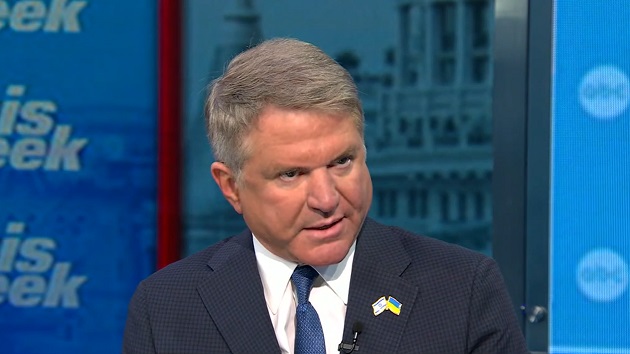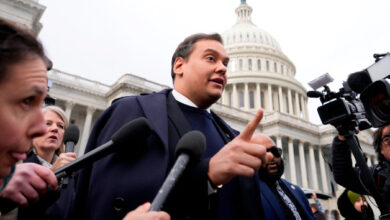Mike Johnson earns bipartisan praise for backing Ukraine aid, suggesting his speakership is safe

Speaker Mike Johnson earned praise from both a top Republican and a progressive Democrat on Sunday for allowing votes on a $95 billion foreign aid package, suggesting he’ll be able to hold onto his job if conservative hard-liners make good on their threat to force a vote to remove him as the leader of the House.
“I am so proud of the speaker, Mike Johnson. He went through a transformation,” House Foreign Affairs Committee Chairman Michael McCaul, a Texas Republican, said on ABC News’ “This Week.” “At the end of the day, a profile in courage is putting the nation above yourself — and that’s what he did. He said, ‘At the end of the day, I’m going to be on the right side of history, irrespective of my job,’ and I think that was what I admired so much.”
Rep. Ro Khanna, a Democrat from California, agreed.
“I disagree with Speaker Johnson on many issues, and I’ve been very critical of him,” Khanna told “This Week” co-anchor Jonathan Karl in a separate interview. “But he did the right thing here and he deserves to keep his job ’til the end of his term.”
Georgia Republican Rep. Marjorie Taylor Greene, one of Johnson’s loudest critics within their party, has proposed but not yet acted on a motion to vacate the speakership over his support for the foreign aid bills — in particular $60.8 billion to help Ukraine in its fight against Russia’s invasion.
More Republicans, including House Republican Conference Chair Elise Stefanik, voted against the Ukraine aid bill than for it over the weekend.
Greene would need only one other Republican to join her in ousting Johnson, as happened last year to Kevin McCarthy, unless enough Democrats side with him. Khanna suggested on Sunday that they will — even absent additional concessions.
“Would you and fellow Democrats that will protect him at this moment — ask for anything in return?” Karl pressed.
“I’ll leave the negotiations to … [Minority Leader Hakeem] Jeffries, but I don’t think everything in politics needs to be transactional,” Khanna said. “I think here you have Speaker Johnson, who not only put this up for a vote but he also separated the bills, which I thought was courageous. He let people vote their conscience on Taiwan, on the offensive aid to Israel, on Ukraine. And I give him credit for that.”
The House votes on Saturday — advancing the four foreign aid bills for Ukraine, Israel, Taiwan and other Indo-Pacific allies — marked a dramatic reversal for Republican leaders like Johnson, who for months have said additional funds to Ukraine must be tied to a tightening of U.S. border and immigration laws.
But efforts to broker compromise on that point failed to win over enough conservatives. A high-profile agreement in the Senate to overhaul border policy was quickly rejected by Johnson and others as insufficient after opposition from former President Donald Trump.
And then, earlier this month, Johnson announced his support for individual votes on additional aid, including to Ukraine as well as to Israel, currently at war with Hamas.
“To put it bluntly, I would rather send bullets to Ukraine than American boys,” Johnson said last week, invoking his own son, who is going to the Naval Academy.
On “This Week,” McCaul was pressed by Karl over Johnson’s changing views — and the lengthy delay involved in the legislative process, to ultimately end up with Congress backing a similar amount of aid as the White House first proposed last year.
McCaul said that Johnson initially supported the position of hard-line Republicans but recognized that with the government divided, another path had to be chosen.
“He tried to do what the, you know, say the Freedom Caucus wanted him to do. It wasn’t going to work in the Senate or the White House,” McCaul said. “At the end of the day, we were running out of time. Ukraine’s getting ready to fall.”
Johnson’s classified briefings and hearing from Republican leaders on the issue like House Intelligence Chairman Mike Turner had influenced his thinking, McCaul said.
He suggested that, essentially, Johnson, once a little-known legislator, had to learn on the job after being thrust into the speakership in the fall amid a chaotic power struggle within the GOP’s House conference.
“He became the man that went from a district in Louisiana to the speaker of the United States to also someone who had to look at the entire world and had to carry the burden of that and make the right decision,” McCaul said.
“The stock in Mike Johnson’s gone way up. I think the respect for him’s gone way up because he did the right thing irrespective of his job. That garnered a lot of respect,” McCaul continued. “And also from the Democrat side.”
Beyond just the foreign aid bills that were approved on Saturday, Johnson has had to repeatedly use the votes of the Democratic minority in order to move forward on some key legislation, like government funding.
That’s because Republicans hold only a very narrow majority of a few votes but have been unable to reach consensus among themselves on various bills.
Asked on “This Week” if such a dynamic indicates the House is actually now in some kind of “coalition government,” McCaul replied, “I don’t know, maybe some people like that.”
He then dinged lawmakers like Greene for her ultimatum against Johnson.
“When the motion gets threatened every week in the Congress, that is being abused,” McCaul said. “And I think we need to fix that. That is a tool that’s being abused by a minority when the majority of my conference don’t agree with them.”
He said that on the issue of Ukraine aid, Republican colleagues like Greene, who decry more aid as a waste over major domestic problems, “bought into this notion that it’s an either/or proposition. … You can’t support Ukraine without the border. We can do both. We’re a great nation. Now we are stuck in a political issue here.”
“The eyes of the world are watching and our adversaries are watching and history is watching,” he went on to say. “And that’s what I kept telling my colleagues.”
Rep. Khanna, in his separate interview, expanded on his views on another big part of the aid votes this weekend: more money for Israel as it fights Hamas in Gaza after Hamas’ Oct. 7 terror attack sparked a war.
Khanna was one of 37 Democrats who voted against the individual aid bill for Israel, but he sought to draw a contrast between his opposition for offensive funds versus defensive funds to allow Israel to protect itself.
“It was a hard vote. I mean, look, it — this was a stance against a blank check for [Israeli Prime Minister Benjamin] Netanyahu and offensive weapons unconditionally while he’s talking about going into Rafah … when we know more women and children are going to die,” Khanna said, echoing the increasing criticism that Israel’s bombardment of Gaza cities has killed far too many civilians. (Israel insists it takes steps to protect civilians.)
“We wanted to make it clear that there has to be a change in strategy and no more famine and suffering in Gaza,” Khanna said, continuing: “So why are we giving this unconditionally to Netanyahu when the entire world is saying that there’s famine there, that we need a new strategy, that we need release of the hostages [thought to be held by Hamas] and peace?”
Pressed by Karl on his vote against funding for Israel in the wake of Iran’s direct strikes on the country this month — marking a new phase in what has long been seen as a shadow war between them — Khanna said he would have supported strictly defense-related monies.
The goal, however, should be an end to the fighting through coalition building in the region, he said.
“The reality is, until we have a security cooperation effort, a diplomatic architecture in the Middle East, with Iran, with Saudi Arabia, with Israel, you’re never going to get peace,” he said.
Khanna also took a skeptical view of the legislative push to force TikTok’s Chinese parent company to sell it or face a ban in the U.S. amid data security and foreign influence concerns, which TikTok calls baseless.
“I don’t think it’s going to pass First Amendment scrutiny because I think there are less restrictive alternatives. … I doubt it survives scrutiny in the Supreme Court,” Khanna predicted.
Copyright © 2024, ABC Audio. All rights reserved.






